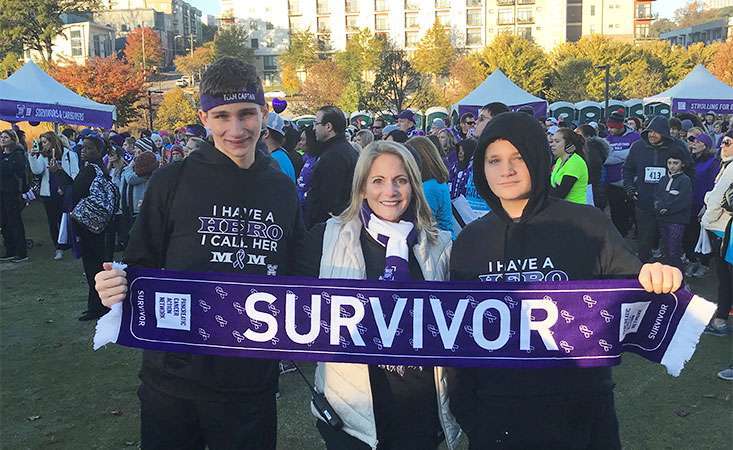
Elise Tedeschi was shocked when she was diagnosed with stage IV pancreatic cancer. She was only 42 years old, enjoying a demanding yet rewarding career, happily married and raising two boys, Ryan, in kindergarten, and Jake, in the second grade. Tedeschi truly had her whole life ahead of her.
It took her almost 10 months of numerous doctor visits and numerous tests before finally receiving the correct diagnosis at an NCI-designated cancer center. Tedeschi realized that finding the right doctor for her was crucial, but not easy.
“Getting a second and third opinion is so vital, especially in the beginning,” Tedeschi said. “You have to find a doctor that will fight for you. It can dramatically change your treatment plan.”
The treatment plan Tedeschi and her doctor agreed on was influenced by a key factor – her BRCA2 mutation. Tedeschi underwent genetic testing after her diagnosis because it was likely she had the gene mutation since her mother, sister and brother had all tested positive.
Tedeschi was surprised to learn that testing positive for BRCA2 could be a good thing when treating pancreatic cancer. Research shows that BRCA2 is especially vulnerable to certain treatments. So, while the genetic mutation increased her risk for the disease, it may also help her fight it.
Precision medicine, treatment based on your tumor’s biology, is a promising field in pancreatic cancer.
Tedeschi’s treatment, an aggressive chemotherapy, was in fact effective but she dealt with numerous side effects, including neuropathy, nose bleeds, hair loss and significant weight loss, getting down to 89 pounds.
After 12 rounds of chemotherapy, her medical team decided to give her a break from the chemo cocktail and do 25 rounds of stereotactic body radiation along with a 24/5 chemo pump of 5FU.
During radiation, Tedeschi could see her tumor markers coming down steadily. And on Oct. 4, Tedeschi got incredible news. A PET scan and CT scan showed no evidence of disease. That was over six years ago.
Tedeschi attributes her miracle to faith, family, friends and fun. She was lucky enough to have her sister, Cari, as the leader in her support system. During treatment, Tedeschi concentrated on being positive, staying as healthy as possible and continuing to make memories with her husband, Patrick, and kids while she worked every day.
“I felt it was so important to still live my life and do things that made me happy,” Tedeschi said. “I went to my kids’ soccer games, swim team practice and school functions. I knew I couldn’t just quit my job and think about having cancer every day. I was really thankful to be able to work. Having a home office helped quite a bit!”
Cari was also a big help. She stepped up on the research front — which included reading information on the Pancreatic Cancer Action Network (PanCAN) website and watching their educational webinars. This key research allowed her to continuously ask questions and help determine what their next plan of attack might be.
Cari came across PanCAN’s Survivor & Caregiver Network during her research. Through this group, pancreatic cancer survivors and caregivers correspond by phone or email with others also experiencing the disease. Tedeschi connected with a stage IV pancreatic cancer survivor, young like herself, who made her feel less alone.
Tedeschi’s support system also kept her motivated.
Her friends ran marathons in her honor, brought over dinner or picked up her kids and took them to play dates. One childhood friend knew that Tedeschi was concerned about losing her hair. He decided to cut and donate his own hair in Tedeschi’s name.
Tedeschi’s friends really rallied around her and became her constant cheerleaders on social media. It was the type of support and encouragement that Tedeschi needed. “As I continued to share my journey, I was blown away by all the support and started to feel as though I couldn’t let them down and I had to beat this beast,” she said.
Tedeschi had always been a positive person and found that having positive mindset, especially when it came to cancer, was crucial.
“I remember thinking, if I truly have nine months to live, I am going to make sure I spend as much time as possible with my kids making memories rather than feeling defeated and sad,” Tedeschi said. “There were plenty of times that I was too weak to do activities, so I would just spend that time loving on them and sharing as many stories as possible.”
She not only stayed strong and positive for her kids, she has done the same for other patients over the past several years. Tedeschi has volunteered for PanCAN’s Survivor & Caregiver Network, connecting with others facing the disease and sharing her story.
“Our stories are so important,” Tedeschi said. “They give hope.”
Any treatments mentioned in this story may not be appropriate or available for all patients. Doctors take many things into account when prescribing treatments including the stage and type of cancer and the overall health of the patient. Contact PanCAN Patient Services for personalized treatment options.
















